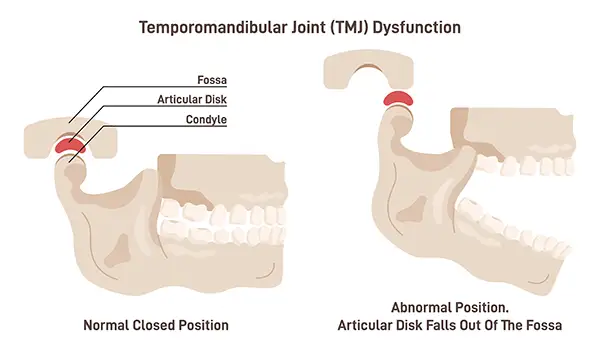When Your Tmj Pain is More than Just a Nuisance
Posted on 6/16/2025 by Surprise Oral & Implant Surgery |
 Have you been experiencing clicking, popping, or pain in your jaw? If so, you may be one of the millions of people who suffer from temporomandibular joint (TMJ) disorder. While TMJ pain can be a nuisance, it can also be a sign of a more serious underlying problem. In this article, we will discuss the causes and symptoms of TMJ disorder, as well as the different treatment options available. Have you been experiencing clicking, popping, or pain in your jaw? If so, you may be one of the millions of people who suffer from temporomandibular joint (TMJ) disorder. While TMJ pain can be a nuisance, it can also be a sign of a more serious underlying problem. In this article, we will discuss the causes and symptoms of TMJ disorder, as well as the different treatment options available.
What is TMJ?
The temporomandibular joint, or TMJ, is a hinge joint that connects your jawbone to your skull. It allows you to open and close your mouth, talk, and chew. TMJ disorder occurs when there is a problem with the joint or the muscles that surround it.
Causes of TMJ Disorder
There are many factors that can contribute to TMJ disorder, including:
| • |
Stress: Stress can cause you to clench or grind your teeth, which can put strain on the TMJ. |
| • |
Misalignment of the jaw: If your jaw is not properly aligned, it can put stress on the TMJ joint. |
| • |
Arthritis: Arthritis can damage the cartilage in the TMJ joint, causing pain and inflammation. |
| • |
Injury: A blow to the jaw can damage the TMJ joint and surrounding tissues. |
| • |
Bruxism: This is the clenching or grinding of teeth, usually during sleep. This can put a lot of stress on the TMJ joint and lead to pain. |
Symptoms of TMJ Disorder
The symptoms of TMJ disorder can vary from person to person, but they may include:
| • |
Pain in the jaw, face, or ears |
| • |
Clicking or popping sounds in the jaw |
| • |
Difficulty opening or closing the mouth |
| • |
Locking of the jaw |
| • |
Headaches |
| • |
Earaches |
| • |
Tinnitus (ringing in the ears) |
| • |
Facial pain |
| • |
Pain when chewing |
Oral Care and TMJ
While oral care is important for everyone, it is especially important for people with TMJ disorder. This is because poor oral hygiene can contribute to TMJ problems. Brushing your teeth twice a day, flossing daily, and seeing your dentist regularly for checkups and cleanings can help to keep your mouth healthy and prevent TMJ problems.
Restoration Dentistry and TMJ
In some cases, TMJ disorder can be caused by problems with your bite. If your bite is not properly aligned, it can put stress on the TMJ joint. Restoration dentistry can help to correct bite problems and improve the function of the TMJ joint.
Treatment Options for TMJ Disorder
The treatment for TMJ disorder will vary depending on the underlying cause of the problem. Some common treatment options include:
| • |
Lifestyle changes: This may include stress management techniques, such as relaxation exercises or biofeedback. It may also involve avoiding chewing gum and hard foods, and using a mouth guard at night to prevent teeth grinding. |
| • |
Medications: Over-the-counter pain relievers, such as ibuprofen or naproxen, can help to reduce pain and inflammation. In some cases, your doctor may prescribe stronger medications, such as muscle relaxants or antidepressants. |
| • |
Physical therapy: Physical therapy can help to strengthen the muscles around the TMJ joint and improve its range of motion. |
| • |
Splints or mouth guards: These devices can be worn to help reposition the jaw and reduce stress on the TMJ joint. |
| • |
Surgery: Surgery is rarely necessary for TMJ disorder, but it may be an option if other treatments have not been successful. |
When to See a Doctor
If you are experiencing TMJ pain, it is important to see a doctor or dentist to get a diagnosis and discuss treatment options. If your symptoms are severe or getting worse, or if you have any of the following symptoms, you should see a doctor right away:
| • |
Difficulty swallowing or speaking |
| • |
Numbness or tingling in the face |
| • |
Swelling in the face or jaw |
| • |
Fever |
| • |
Ear pain or drainage |
Conclusion
TMJ disorder can be a painful and debilitating condition, but there are a number of effective treatment options available. If you are experiencing TMJ pain, please see a doctor or dentist to get a diagnosis and discuss your treatment options.
Additional Resources
| • |
The American Dental Association: https://www.ada.org/en/member-center/oral-health-topics/temporomandibular-joint-and-muscle-disorders |
| • |
The National Institute of Dental and Craniofacial Research: https://www.nidcr.nih.gov/health-info/tmj |
| • |
The American Academy of Oral and Maxillofacial Surgeons: https://www.aaoms.org/tmj |
I hope this information has been helpful. Please remember that this is just a general overview of TMJ disorder and treatment options. It is important to see a doctor or dentist for a diagnosis and to discuss your individual treatment options. |
|
